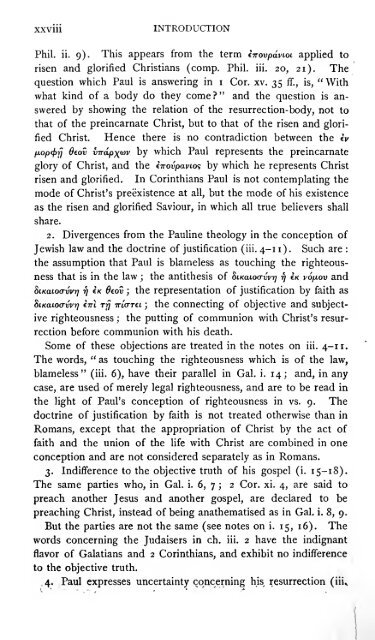Philippians and Philemon - MR Vincent - 1906.pdf
Philippians and Philemon - MR Vincent - 1906.pdf
Philippians and Philemon - MR Vincent - 1906.pdf
You also want an ePaper? Increase the reach of your titles
YUMPU automatically turns print PDFs into web optimized ePapers that Google loves.
XXviii<br />
INTRODUCTION<br />
Phil. ii. 9). This appears from the term ivovpavioi applied to<br />
risen <strong>and</strong> glorified Christians (comp. Phil. iii. 20, 21). The<br />
question which Paul is answering in i Cor. xv, 35 ff., is, " With<br />
what kind of a body do they come?" <strong>and</strong> the question is an-<br />
swered by showing the relation of the resurrection-body, not to<br />
]<br />
that of the preincarnate Christ, but to that of the risen <strong>and</strong> glorified<br />
Christ. Hence there is no contradiction between the iv<br />
Otov by which Paul represents the preincarnate<br />
glory of Christ, <strong>and</strong> the?by which he represents Christ<br />
risen <strong>and</strong> glorified. In Corinthians Paul is not contemplating the<br />
mode of Christ's preexistence at all, but the mode of his existence<br />
as the risen <strong>and</strong> glorified Saviour, in which all true believers shall<br />
share.<br />
2. Divergences from the Pauline theology in the conception of<br />
Jewish law <strong>and</strong> the doctrine of justification (iii. 4-1 1).<br />
Such are :<br />
the assumption that Paul is blameless as touching the righteousness<br />
that is in the law ; the antithesis of e'/c <strong>and</strong><br />
€ ; the representation of justification by faith as<br />
cVi rrj ; the connecting of objective <strong>and</strong> subject-<br />
ive righteousness ; the putting of communion with Christ's resur-<br />
rection before communion with his death.<br />
Some of these objections are treated in the notes on iii. 4-1 1.<br />
The words, " as touching the righteousness which is of the law,<br />
blameless" (iii. 6), have their parallel in Gal. i. 14; <strong>and</strong>, in any<br />
case, are used of merely legal righteousness, <strong>and</strong> are to be read in<br />
the light of Paul's conception of righteousness in vs. 9. The<br />
doctrine of justification by faith is not treated otherwise than in<br />
Romans, except that the appropriation of Christ by the act of<br />
faith <strong>and</strong> the union of the Hfe with Christ are combined in one<br />
conception <strong>and</strong> are not considered separately as in Romans.<br />
3. Indifference to the objective truth of his gospel (i. 15-18).<br />
The same parties who, in Gal. i. 6, 7 ; 2 Cor. xi. 4, are said to<br />
preach another Jesus <strong>and</strong> another gospel, are declared to be<br />
preaching Christ, instead of being anathematised as in Gal. i. 8, 9.<br />
But the parties are not the same (see notes on i. 15, 16). The<br />
words concerning the Judaisers in ch. iii. 2 have the indignant<br />
flavor of Galatians <strong>and</strong> 2 Corinthians, <strong>and</strong> exhibit no indifference<br />
to the objective truth.<br />
4. Paul expresses uncertainty concerning his resurrection (iii^





